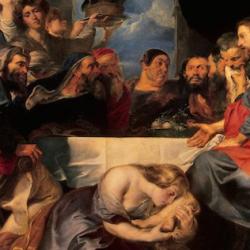Exhortation for Feb 8:
Toward the end of this morning’s sermon text, Jesus takes the twelve aside for some individual instruction. He tells them, as He has done before, that they are going to Jerusalem so that all the things prophesied about the Son of Man can be accomplished: “He will be delivered up to the Gentiles, and will be mocked and mistreated and spit upon, and after they have scoured Him, they will kill Him, and the third day He will rise again.”
The twelve, to put it mildly, are confused. In fact, Luke stumbles over himself to explain just how confused they were: “They understood none of these things” and besides that “this saying was hidden from them.” Oh, yes, and “they did not comprehend the things that were said.” Luke has used the same technique of redundancy before: Just before Jesus started off with the disciples on His journey to Jerusalem, He told them that they should expect Jesus to be “delivered into the hands of men.” At that time, Luke writes, “they did not understand this statement, and it was concealed from them so that they did not perceive it.”
What the disciples fail to understand is not only the fate of Jesus. They fail to understand what they themselves are going to face when they get to Jerusalem. They have left everything, as Peter says, but they have only the smallest inkling that before it’s all over the twelve will flee in twelve different directions, scattered like sheep when the shepherd is struck, until they are gathered again as the body of Christ after Jesus’ resurrection.
Immediately after we’re told about the disciples’ confusion, Jesus performed the last of the healing miracles in Luke, and it’s a miracle that fulfills the promise of Jesus’ first sermon, where Jesus said He had come to bring “recovery of sight to the blind.” Whatever their weaknesses, the disciples were fortunate in their choice of a master: As Jesus demonstrates, He is one who “gives back sight.” The blind man at the gate of Jericho ironically knows Jesus better than the disciples, calling to Him as “Son of David.” And he is transformed by his healing. He begins with begging, and ends the passage glorifying God. He begins calling Jesus Son of David, and ends by calling Him Lord. He begins sitting beside the road, but by the end of the story He is following Jesus on the road. The healing of the blind man gives hope to the disciples: For if Jesus can open his eyes, He can also open the eyes of the disciples, and make them understand, comprehend, and perceive; He can unveil the hidden things; He can make them understand the cross.
We have been through a season of turmoil and conflict in Moscow, mostly surrounding this weekend’s history conference. There has been much to sort out during this period, and there is doubtless still much to sort out. But things might get clearer as we go. Nick Gier, former philosophy professor at U of I has helpfully clarified the issues in a recent letter to the editor: He makes it clear that he is not simply opposed to Doug Wilson’s views on the South or Southern slavery; Gier’s target is “fundamentalism.” He calls it “one of the most destructive forces in the world,” and believes that fundamentalism “deserves neither “our respect nor tolerance.” And you should be aware that, whether or not you agree with Doug on slavery, every last one of you counts as a fundamentalist in Gier’s book.
This means that opposition and conflict will continue, or if it dies down for a while, we should expect it to be revived at some point, in some form. We should certainly not be seeking it. We should not be making ourselves easy targets for our opponents. We should be devoting ourselves to faithfulness in our marriages, in raising our children, at work, in worship, in the life of the church, in ministry to those outside. But we should not be deceived into thinking that we can be faithful to Jesus and avoid persecution. We have the benefit of the full account of Jesus’ life, death, and resurrection, as well as the gift of the Spirit. We no longer have any excuse for blindness on this point. We are called to take up the cross, and we should expect in persecution, opposition, hatred, distortions, lies and everything else that can be cooked up against us. That is simply the cost of following a crucified Messiah.











